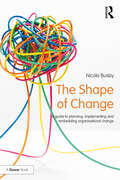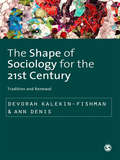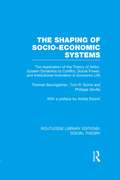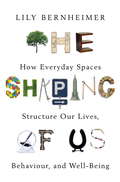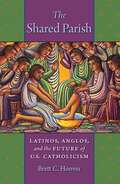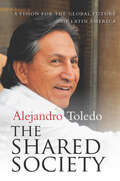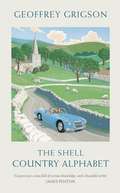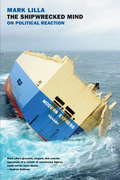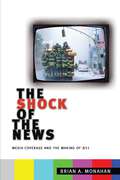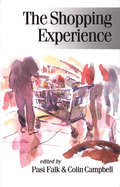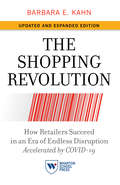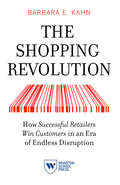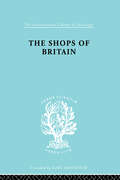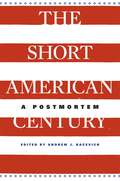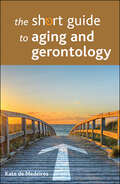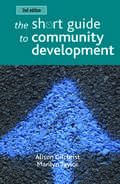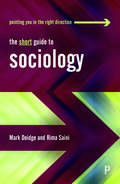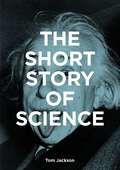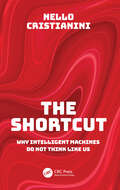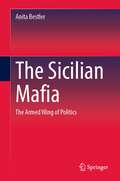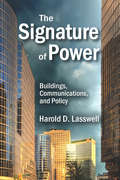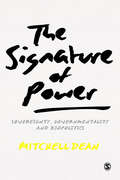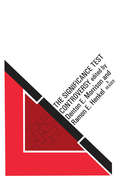- Table View
- List View
The Shape of Change: A guide to planning, implementing and embedding organisational change
by Nicola BusbyNo organisations, change initiative or stakeholder is ever the same. The way business change management is shaped to work with and get the best out of every different change situation makes a vital contribution to the success of the change. The Shape of Change is the first business change management book to focus solely on the practical challenges of how to plan, implement and embed successful business change initiatives in a wide range of organisations from the business change manager’s point of view. It focuses on shaping every different change approach to take into consideration each individual situation including organisational culture, the type and impact of change the initiative, the attitudes and concerns of stakeholders and the potential for resistance within the organisation. Using a series of example change initiatives in private, public and non-profit sectors, it describes the change management journey, highlighting key points where business change management interventions are essential, and exploring how it feels to undertake business change initiatives in a wide range of situations, from communicating the initial change idea to ensuring the change is embedded and working well in business as usual. Accessible and comprehensive, The Shape of Change is relevant to anyone working in or planning organisational change.
The Shape of Sociology for the 21st Century: Tradition and Renewal (SAGE Studies in International Sociology)
by Ann Denis Devorah Kalekin-Fishman"This is an important and thought-provoking collection of contemporary articles on the current crisis in social theory." - Professor Roger Penn, Lancaster University "With a comprehensive vision, great sociologists from around the world address the challenges of the new century." - Professor Michael Burawoy, University of California, Berkeley Over the past century, the field of sociology has experienced extraordinary expansion and vitality. But is this growth positive or negative - a promise of diversity or a threat of fragmentation? This critical volume explores the meaning of sociology and sociological knowledge in light of the recent growth and institutionalization of the discipline. A stellar group of international authors powerfully identify, question, and transform key assumptions in sociology. Leading us through the challenges faced by sociology, and the possible strategies for addressing them in the future, the book includes key issues such as: globalization development social policy inequality. An important companion for advanced undergraduates, postgraduates and researchers engaged with contemporary sociological theory, sociology of knowledge and sociological analysis.
The Shaping of Socio-Economic Systems: The application of the theory of actor-system dynamics to conflict, social power, and institutional innovation in economic life (Routledge Library Editions: Social Theory)
by Thomas Baumgartner Tom R. Burns Philippe DeVilleActor-systems dynamics is an innovative, multidisciplinary methodology for investigating and analyzing social struggles over economic resources and the related interplay between economic and socio-political institutions and processes. The authors, sociologists and economists, offer a systemic perspective on contemporary socio-economic issues such as economic crisis, unemployment, inflation, economic democracy and development; in their analyses, they identify several of the key factors that drive people to interact, to initiate change and transformation as well as to resist such change. Major underlying themes in the book are: Conflict over the distribution of economic resources and economic policies and institutions; the structural bases of economic inequality and conflict; the shaping and reshaping of socio-economic institutions, and the contradictions, conflicts and instabilities evoked by such developments; the failure of orthodox economic theories, including Keynesianism, in the face of recurrent economic crises and instabilities; the development and application of an open, dynamic actor-oriented systems theory – grounded in the social sciences – addressing complex socio-economic phenomena in ways diverging substantially from conventional economics. All in all, the papers collected here deal, on the one hand, with social power, conflict, and struggle concerning economic resources and institutions and, on the other hand, the structural and other factors which drive powering initiatives, conflict, and social innovation and transformation. The book is addressed to a broad spectrum of social and managerial scientists concerned with socio-economic issues, institutions, and development.
The Shaping of Us: How Everyday Spaces Structure our Lives, Behaviour, and Well-Being
by Lily Bernheimer"You are going to be transported by what Bernheimer has to say. You'll make different decisions and figure out how your brain is working and what should be prioritized in your life" Jo Good, BBC LondonWhat makes everyday spaces work, how do they shape us, and what do they say about us?The spaces we live in - whether public areas, housing, offices, hospitals, or cities - mediate community, creativity, and our very identity, making us who we are. Using insights from environmental psychology, design, and architecture, The Shaping of Us reveals the often imperceptible ways in which our surroundings influence our behaviour.Wide-ranging and global examples cover the differences between personalities and nationalities, explore grass-roots and mainstream efforts to build environments promoting well-being, and look ahead to what will become of us if we don't listen closely to what we know is good for us.You will learn whether you are a natural 'prospector' or 'refuger' in the office environment, what roundabouts and stoplights say about British and American culture, whether you are guilty of NIMBYism or being drawn to 'ruin porn', and how the half-house may be a common sight in the near future.The environments we inhabit define our identities - from the earliest moments of our evolution to the worlds we build around ourselves.
The Shared Parish: Latinos, Anglos, and the Future of U.S. Catholicism
by Brett C. HooverAsfaith communities in the United States grow increasingly more diverse, manychurches are turning to the shared parish, a single church facilityshared by distinct cultural groups who retain their own worship and ministries.The fastest growing and most common of these are Catholic parishes shared byLatinos and white Catholics. Shared parishes remain one of the few institutionsin American society that allows cultural groups to maintain their own languageand customs while still engaging in regular intercultural negotiationsover the sharedspace.Thisbook explores the shared parish through an in-depth ethnographic study of aRoman Catholic parish in a small Midwestern city demographically transformed byMexican immigration in recent decades. Through its depiction of shared parishlife, the book argues for new ways of imagining the U.S. Catholic parish as anorganization. The parish, argues Brett C. Hoover, must be conceived as botha congregation and part of a centralized system, and as onepiece in a complex social ecology. The Shared Parish alsoposits that the search for identity and adequate intercultural practice in suchparishes might call fornew approaches to cultural diversity in U.S. society, beyond assimilation ormulticulturalism. We must imagine a religious organization that accommodatesboth the need for safe space within distinct groups and for social networksthat connect these groups as they struggle to respectfully co-exist.
The Shared Society: A Vision for the Global Future of Latin America
by Alejandro ToledoLatin America has gone through a major transformation in the past two decades. According to the United Nations, with the discovery of new oil and mineral deposits and increases in energy exports, manufacturing and tourism, Latin America's economic growth and development will only continue, foreign investment will increase, and the region's global influence will become greater and greater. This is an historic opportunity for Latin America. Yet, as Stanford economist and former Peruvian President Alejandro Toledo points out in his new book, The Shared Society, social strife threatens to undermine its recent economic and political progress. The specter of unsustainable growth and greed threatens to compromise the environment. Economic growth rates could slow and democracy could deteriorate into familiar forms of authoritarian populism. In The Shared Society, Toledo, whose tenure as president of Peru helped spur its economic renaissance, develops a plan for a future Latin America in which its population is not only much better off economically than today, but in which the vast 40 percent of Latin America's poor and marginalized are incorporated into a rising middle class, democratic institutions work more effectively, and the extraordinary ecosystem of Latin America is preserved. This is Toledo's vision for a just, sustainable, and prosperous shared society. To achieve this, Toledo lays out a set of principles and concrete, implementable ideas with which Latin Americans can reinvent themselves as a leading force for change in a continuously globalizing society beset by inequalities and global problems such as climate change and shortages of clean drinkable water, food security, human rights violations and weak democratic institutions. Toledo argues that only extraordinary efforts of vision, determination, courage and inspired leadership will set Latin America on the path to inclusive development, and this book provides a visionary manifesto and blueprint for creating that ideal shared society.
The Shell Country Alphabet: The Classic Guide to the British Countryside
by Geoffrey GrigsonIn the 1960s Geoffrey Grigson travelled around England writing the story of the secret landscape that is all around us, if only we take the time to look and see. The result is a book that will take you on an imaginative journey, revealing hidden stories, unexpected places and strange phenomena. From green men, ice-scratches, cross-legged knights and weathercocks to rainbows, clouds and stars; from place-names and poets to mazes, dene-holes and sham ruins, via avenues, dewponds and village greens, The Shell Country Alphabet will help you discover the world that remains, just off the motorway.'Geoffrey Grigson resurrected the minor, the provincial and the parochial ... [he was] an erudite and unrivalled topographer ... ardent in promoting informed awareness of the distinctiveness of place' Toby Barnard'An anthologist of genius' P.J. Kavanagh
The Shipwrecked Mind: On Political Reaction
by Mark LillaWe don't understand the reactionary mind. As a result, argues Mark Lilla in this timely book, the ideas and passions that shape today's political dramas are unintelligible to us. The reactionary is anything but a conservative. He is as radical and modern a figure as the revolutionary, someone shipwrecked in the rapidly changing present, and suffering from nostalgia for an idealized past and an apocalyptic fear that history is rushing toward catastrophe. And like the revolutionary his political engagements are motivated by highly developed ideas. Lilla begins with three twentieth-century philosophers--Franz Rosenzweig, Eric Voegelin, and Leo Strauss--who attributed the problems of modern society to a break in the history of ideas and promoted a return to earlier modes of thought. He then examines the enduring power of grand historical narratives of betrayal to shape political outlooks since the French Revolution, and shows how these narratives are employed in the writings of Europe's right-wing cultural pessimists and Maoist neocommunists, American theoconservatives fantasizing about the harmony of medieval Catholic society and radical Islamists seeking to restore a vanished Muslim caliphate. The revolutionary spirit that inspired political movements across the world for two centuries may have died out. But the spirit of reaction that rose to meet it has survived and is proving just as formidable a historical force. We live in an age when the tragicomic nostalgia of Don Quixote for a lost golden age has been transformed into a potent and sometimes deadly weapon. Mark Lilla helps us to understand why.
The Shock of the News: Media Coverage and the Making of 9/11
by Brian A. MonahanHow did the events of September 11, 2001 come to be thought of as 9/11? The Shock of the News is an authoritative account of post-9/11 political and social processes, offering an in-depth analysis of the media coverage of this momentous event. Brian Monahan demonstrates how 9/11 has been transformed into a morality tale centered on patriotism, victimization, and heroes.Introducing the idea of “public drama” as a way of making sense of how media processed and packaged the 9/11 attacks for their audiences, Monahan not only illuminates how and why the coverage took shape as it did, but also provides us with new insights into the social, cultural, and political consequences of the attacks and their aftermath. Monahan explains how and why 9/11 became such a potent symbol, exploring how meanings and symbols get created, reinforced, and disseminated in modern society. Ultimately, Monahan offers an important new understanding of this singular event of our time, and his compelling narrative brings the momentous events back into focus.
The Shopping Experience (Published in association with Theory, Culture & Society #52)
by Professor Colin B Campbell Dr Pasi FalkThis shrewd and probing book seeks to theorize shopping as an autonomous realm. It avoids the reductionist characteristics of economics and marketing. At the same time it avoids the moralizing tone of many contemporary discussions of shopping and consumption. It also contains an appendix which gives a brief history and selected literature of shopping.
The Shopping Revolution, Updated and Expanded Edition: How Retailers Succeed in an Era of Endless Disruption Accelerated by COVID-19
by Barbara E. KahnFeatured in The New York Times, Bloomberg, and Vox, The Shopping Revolution is “a brisk and thought-provoking anatomy of shopping in the 21st century” (Kirkus Reviews).The retail industry was already in the midst of unparalleled disruption. Then came COVID-19.In a fully updated and expanded edition of The Shopping Revolution: How Retailers Succeed in an Era of Endless Disruption Accelerated by COVID-19, Wharton professor Barbara E. Kahn, a foremost retail expert, examines the companies that have been most successful during a tsunami of change in the industry. She offers fresh insights into what we can learn from these companies’ ascendance and continued transformation in the face of unprecedented challenges. Kahn, also the author of Global Brand Power: Leveraging Branding for Long-Term Growth, examines:In a brand-new chapter, how companies in China, like Alibaba, JD.com, and Pinduoduo have changed the game;How Amazon became the retailer of choice for a large portion of the US population, and how other companies have chosen to work with them or have to compete against them; How Walmart beat out other grocers in the late 1990s to become the leader in food retailing, and how they must pivot to hold their leadership position today; How Warby Parker dared to compete against Luxottica in the lucrative eyewear business, and what that can tell start-ups about how to carve out a niche against a Goliath; How Sephora drew away customers from once-dominant department stores to become the go-to retailers for beauty products. Kahn argues we are just witnessing the start of the radical changes in retail that have been hastened by the pandemic and will revolutionize shopping in every way. Building on these insights, Kahn offers a framework that any company can use to create a competitive strategy to survive and thrive in today’s—and tomorrow’s—retail environment.
The Shopping Revolution: How Successful Retailers Win Customers in an Era of Endless Disruption
by Barbara E. KahnAmazon disrupts everything it touches and upends any market it enters. In the era of its game-changing dominance, how can any company compete? We are just witnessing the start of the radical changes in retail that will revolutionize shopping in every way. As Amazon and other disruptors continue to offer ever-greater value, customers’ expectations will continue to ratchet up, making winning (and keeping) those customers all the more challenging. For some retailers, the changes will push customers permanently out of their reach—and their companies out of business. In The Shopping Revolution, Barbara E. Kahn, a foremost retail expert and professor at The Wharton School, examines the companies that have been most successful during this wave of change, and offers fresh insights into what we can learn from their ascendance. How did Amazon become the retailer of choice for a large portion of the US population, and how can other companies work with them or compete with them?How did Walmart beat out other grocers in the late 1990s to become the leader in food retailing, and how must they pivot to hold their leadership position today?How did Warby Parker make a dent in the once-untouchable Luxottica's lucrative eyewear business, and what can that tell start-ups about how to unseat a Goliath?How did Sephora draw customers away from once-dominant department stores to become the go-to retailers for beauty products, and what can retailers learn from their success?How are luxury and fast-fashion retailers competing in the ever-changing, fickle world of fashion?Building on these insights, Kahn offers a framework that any company can use to create a competitive strategy to survive and thrive in today’s—and tomorrow’s—retail environment.The Shopping Revolution is a must-read for those in the retailing business who want to develop an effective strategy, entrepreneurs looking at starting their own business, and anyone interested in understanding the changing landscape in which they are shopping.
The Shops of Britain: A Study of Retail Distribution (International Library of Sociology #Vol. 15)
by Hermann LevyFirst Published in 1998. Routledge is an imprint of Taylor & Francis, an informa company.
The Short American Century
by Edited by Andrew J. BacevichWriting in Life magazine in February 1941, Henry Luce memorably announced the arrival of the “The American Century. ” The phrase caught on, as did the belief that America’s moment was at hand. Yet as Andrew J. Bacevich makes clear, that century has now ended, the victim of strategic miscalculation, military misadventures, and economic decline. To take stock of the short American Century and place it in historical perspective, Bacevich has assembled a richly provocative range of perspectives. What did this age of reputed American preeminence signify? What caused its premature demise? What legacy remains in its wake? Distinguished historians Jeffry Frieden, Akira Iriye, David Kennedy, Walter LaFeber, Jackson Lears, Eugene McCarraher, Emily Rosenberg, and Nikhil Pal Singh offer illuminating answers to these questions. Achievement and failure, wisdom and folly, calculation and confusion all make their appearance in essays that touch on topics as varied as internationalism and empire, race and religion, consumerism and globalization. As the United States grapples with protracted wars, daunting economic uncertainty, and pressing questions about exactly what role it should play in a rapidly changing world, understanding where the nation has been and how it got where it is today is critical. What did the forging of the American Century-with its considerable achievements but also its ample disappointments and missed opportunities-ultimately yield? That is the question this important volume answers.
The Short Guide to Aging and Gerontology (Short Guides)
by Kate de MedeirosAs the field of aging and gerontology grows worldwide, this exciting guide introduces students to key issues and concepts. It covers topics related to the phenomena of advancing aging, including how older age has been defined historically, cultural myths related to advanced age, health and function in later life, how older age is financed throughout the world, and other key questions. Taking a multiple-perspective approach (including humanities, social and behavioral sciences and policy studies), the book's features include further reading for each chapter, a glossary of key terms, and tables that provide easy reference points.
The Short Guide to Community Development (Short Guides)
by Marilyn Taylor Alison GilchristThe only up-to-date, accessibly written short guide to community development, this third edition offers an invaluable and authoritative introduction. Fully updated to reflect changes in policy, practice, economics and culture, it will equip readers with an understanding of the history and theory of community development, as well as practical guidance on how to do it. This is a key text for all students and practitioners working with communities. It includes: • a broad overview of core themes, concepts, basic practices and key issues in community development; • an analysis of the impact of COVID-19 on community life and well-being, along with the implications for longer-term community support; • additional brand new content on the pressing issues of democratic decline, social fragmentation and isolation, social care pressures, technological developments and climate change.
The Short Guide to Sociology (Short Guides)
by Mark Doidge Rima SainiThis illuminating book offers a fresh and contemporary guide to the field of sociology. By demonstrating the versatility of the sociological imagination, the authors reveal the ways in which thinking sociologically can help us to understand the personal, social and structural changes going on in the world around us. Using real world case studies, the book addresses key sociological themes such as: · global social transformations · social divisions and inequalities · social theory and its practical applications · the personal and the political Providing a set of concepts, tools and perspectives for analysing our social world, the book equips the reader with an understanding of how to start thinking sociologically. With helpful features such as end-of-chapter summaries, key definitions and recommended readings, it is an invaluable resource for students taking an introductory sociology course or those studying sociology at further or higher education level.
The Short Story of Science: A Pocket Guide to Key Histories, Experiments, Theories, Instruments and Methods
by Tom Jackson Mark Fletcher'Nothing in life is to be feared. It is only to be understood. Now is the time to understand more, so that we may fear less' Marie CurieThe Short Story of Science is a new introduction to the complete subject of science. Covering 60 key experiments, from Archimedes' investigations of buoyancy to the discovery of dark matter, and then linking these to the history of science, as well as to the key theories and methods, the book simplifies and explains all the key breakthroughs.Accessible and concise, generously illustrated throughout, and with all the essential information presented without jargon, readers are given all the tools they need to enjoy the fascinating history of scientific knowledge.
The Short Story of Science: A Pocket Guide to Key Histories, Experiments, Theories, Instruments and Methods
by Tom Jackson Mark Fletcher'Nothing in life is to be feared. It is only to be understood. Now is the time to understand more, so that we may fear less' Marie CurieThe Short Story of Science is a new introduction to the complete subject of science. Covering 60 key experiments, from Archimedes' investigations of buoyancy to the discovery of dark matter, and then linking these to the history of science, as well as to the key theories and methods, the book simplifies and explains all the key breakthroughs.Accessible and concise, generously illustrated throughout, and with all the essential information presented without jargon, readers are given all the tools they need to enjoy the fascinating history of scientific knowledge.
The Shortcut: Why Intelligent Machines Do Not Think Like Us
by Nello CristianiniAn influential scientist in the field of artificial intelligence (AI) explains its fundamental concepts and how it is changing culture and society.A particular form of AI is now embedded in our tech, our infrastructure, and our lives. How did it get there? Where and why should we be concerned? And what should we do now? The Shortcut: Why Intelligent Machines Do Not Think Like Us provides an accessible yet probing exposure of AI in its prevalent form today, proposing a new narrative to connect and make sense of events that have happened in the recent tumultuous past, and enabling us to think soberly about the road ahead.This book is divided into ten carefully crafted and easily digestible chapters. Each chapter grapples with an important question for AI. Ranging from the scientific concepts that underpin the technology to wider implications for society, it develops a unified description using tools from different disciplines and avoiding unnecessary abstractions or words that end with -ism. The book uses real examples wherever possible, introducing the reader to the people who have created some of these technologies and to ideas shaping modern society that originate from the technical side of AI. It contains important practical advice about how we should approach AI in the future without promoting exaggerated hypes or fears.Entertaining and disturbing but always thoughtful, The Shortcut confronts the hidden logic of AI while preserving a space for human dignity. It is essential reading for anyone with an interest in AI, the history of technology, and the history of ideas. General readers will come away much more informed about how AI really works today and what we should do next.
The Shrinking American Middle Class
by Joseph DaveyThe United States lost one third of its factory jobs in the past decade as jobs were outsourced offshore, mostly to Asia. Jobs that require a college degree are next to go. China will award six times as many degrees this year as they did ten years ago and any job that can be digitized will be 'tradable'. Estimates of the number of vulnerable jobs range from a low 11 million to a staggering 56 million 'middle class' jobs. The median United States household income has already dropped by seven percent since 2000 and without dramatic changes in the American workforce that trend will become a disaster for middle class Americans.
The Sicilian Mafia: The Armed Wing of Politics
by Anita BestlerThis book offers a completely new approach to the complex social phenomenon of the Mafia: In addition to the origins, organization and actions of the Mafia, the author Anita Bestler examines above all the close connection between organized crime and politics. In the process, readers [also] gain an interesting insight into the complicated political development of Italy from the founding of the state to the present, as well as an answer as to why Italians have a different political mindset.
The Signature of Power: Buildings, Communications, and Policy
by Harold D. LasswellAdvanced industrial societies are becoming aware of the impact of what they do to the physical and biological environment, and also what that environment does to individuals. In The Signature of Power, Harold D. Lasswell examines the symbolic use people make of their surroundings and the complexity of the way they interpret an altered environment. Transformed habitats can change experiences and behaviors. All people seek to maximize their preferred events, such as power and wealth, when they use the environment be it through glass skyscrapers or Gothic estates. In all cases, physical structures give expression to the perspectives of influential individuals and groups.This volume considers the complex interplay between the material and the symbolic. Physical changes introduced for political purposes by architects, planners, and engineers are guided by the perspectives of designers. These and other interactions in human society are simultaneous acts of communication and collaboration. Regardless of whether physical resources are used to transmit messages, such interactions nevertheless have a degree of communicative impact.Physical structures may be profoundly affected by the purposes, assumptions, and identities of those people who plan or change them. Environmental design, says Lasswell, is an instrument of political power.
The Signature of Power: Sovereignty, Governmentality and Biopolitics
by Mitchell Dean'Dean's erudite and relentlessly critical reading of Foucault, Schmitt and Agamben extracts from these authors new insights about the signature of power ... Immensely valuable and a major contribution to social and political thought' - William Walters, Department of Political Science, Carleton University, Ottawa, Canada Mitchell Dean revitalized the study of 'governmentality' with his bestselling book of the same title. His new book on power is a landmark work. It combines an extraordinary breadth of perspective with pinpoint accuracy about what power means for us today. For students it provides sharp readings of the main approaches in the field. On this level, it operates as a foundational work in the study of power. It builds on this to reframe the concept of power, offering original and exceptionally fruitful reading. It throws new light onto the importance of biopolitics, sovereignty and governmentality. Mitchell Dean has established himself as a master of governmentality. This new book will do the same for how we conceptualize and use power. Mitchell Dean is Professor of Public Governance at Copenhagen Business School, Denmark and Professor of Sociology at the University of Newcastle, Australia.
The Significance Test Controversy: A Reader (Methodological Perspectives Ser.)
by Denton E. Morrison Ramon E. HenkelTests of significance have been a key tool in the research kit of behavioral scientists for nearly fifty years, but their widespread and uncritical use has recently led to a rising volume of controversy about their usefulness. This book gathers the central papers in this continuing debate, brings the issues into clear focus, points out practical problems and philosophical pitfalls involved in using the tests, and provides a benchmark from which further analysis can proceed.The papers deal with some of the basic philosophy of science, mathematical and statistical assumptions connected with significance tests and the problems of the interpretation of test results, but the work is essentially non-technical in its emphasis. The collection succeeds in raising a variety of questions about the value of the tests; taken together, the questions present a strong case for vital reform in test use, if not for their total abandonment in research.The book is designed for practicing researchers-those not extensively trained in mathematics and statistics that must nevertheless regularly decide if and how tests of significance are to be used-and for those training for research. While controversy has been centered in sociology and psychology, and the book will be especially useful to researchers and students in those fields, its importance is great across the spectrum of the scientific disciplines in which statistical procedures are essential-notably political science, economics, and the other social sciences, education, and many biological fields as well.Denton E. Morrison is professor, Department of Sociology, Michigan State University.Ramon E. Henkel is associate professor emeritus, Department of Sociology University of Maryland. He teaches as part of the graduate faculty.
